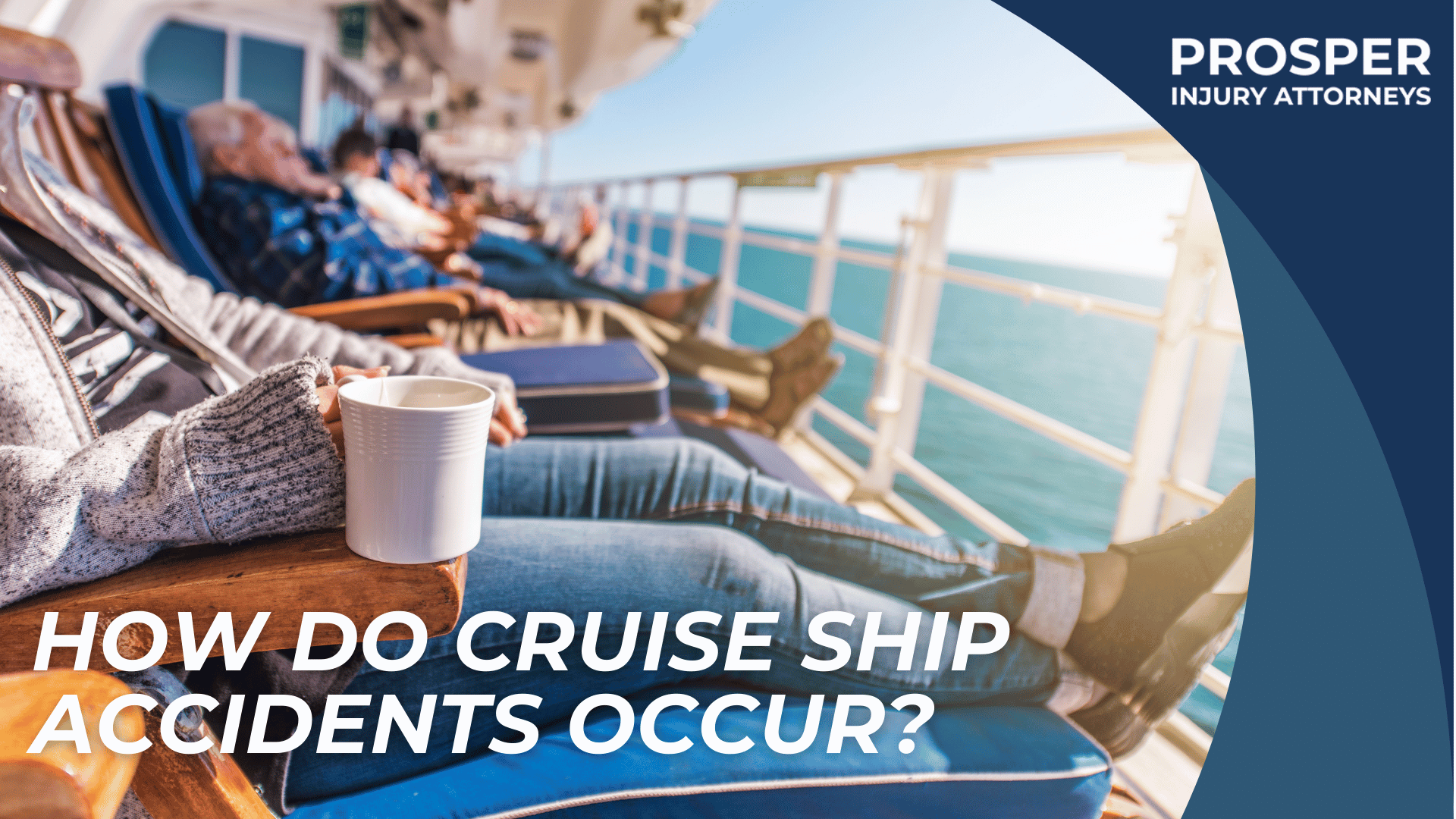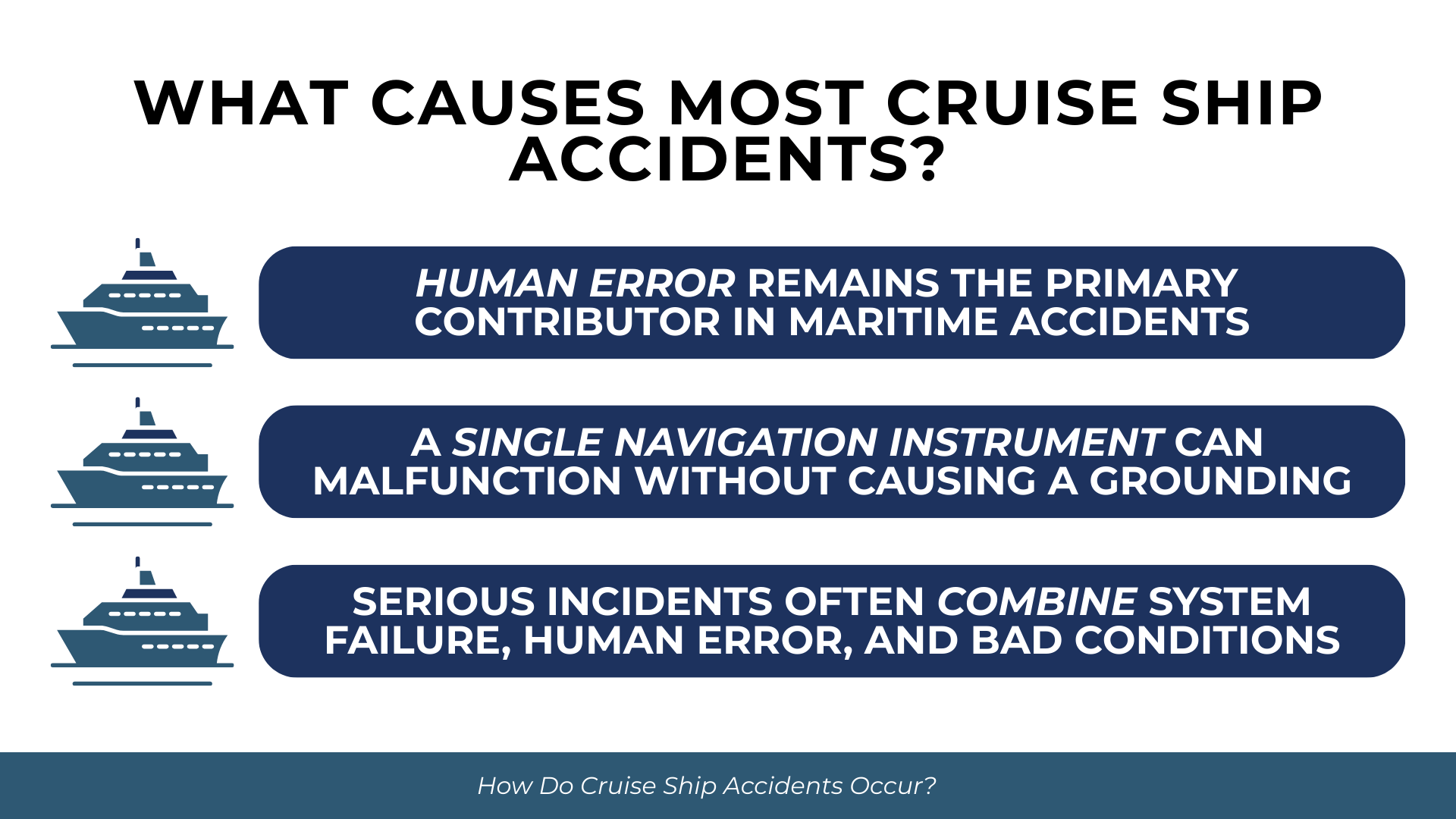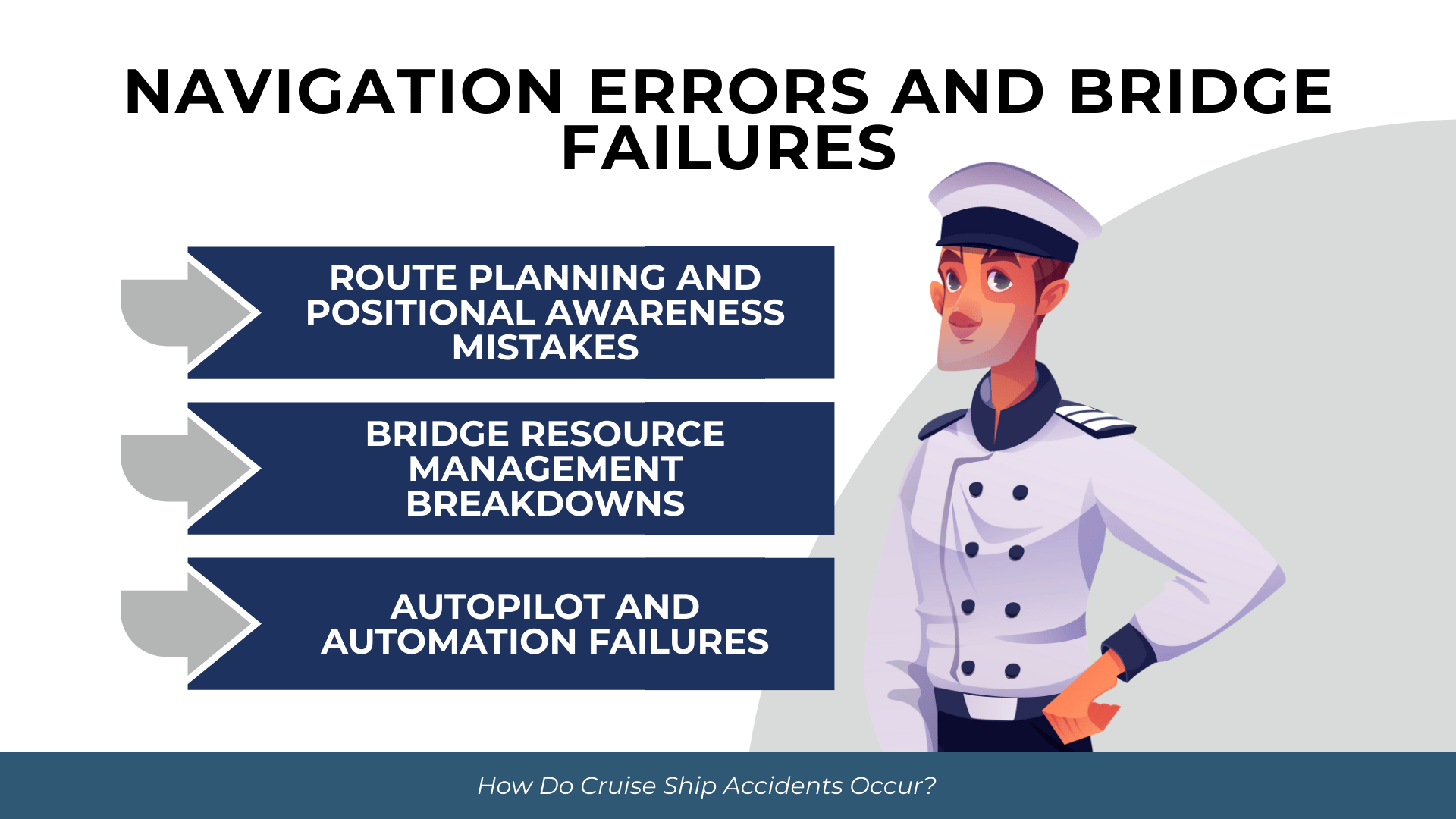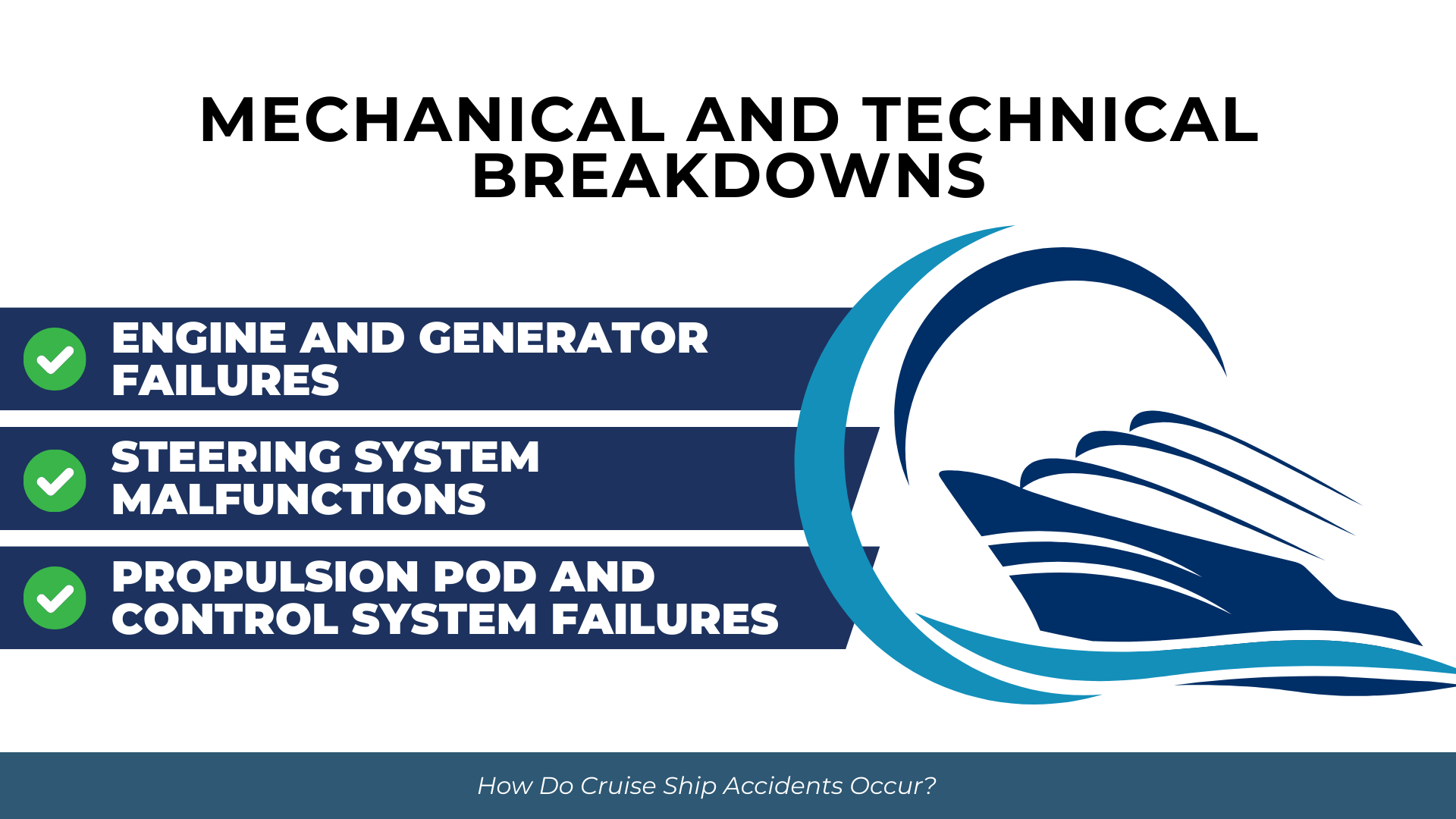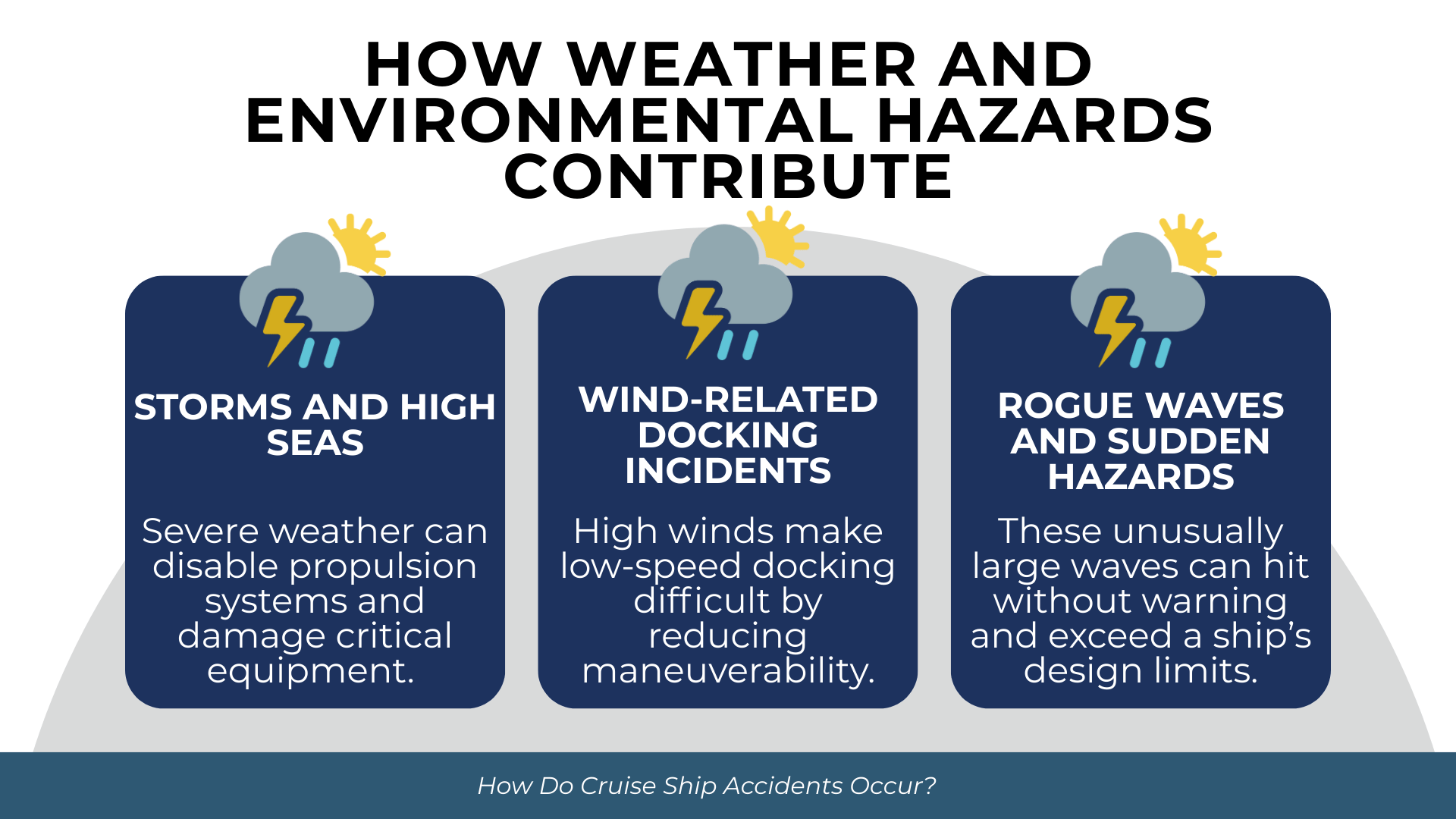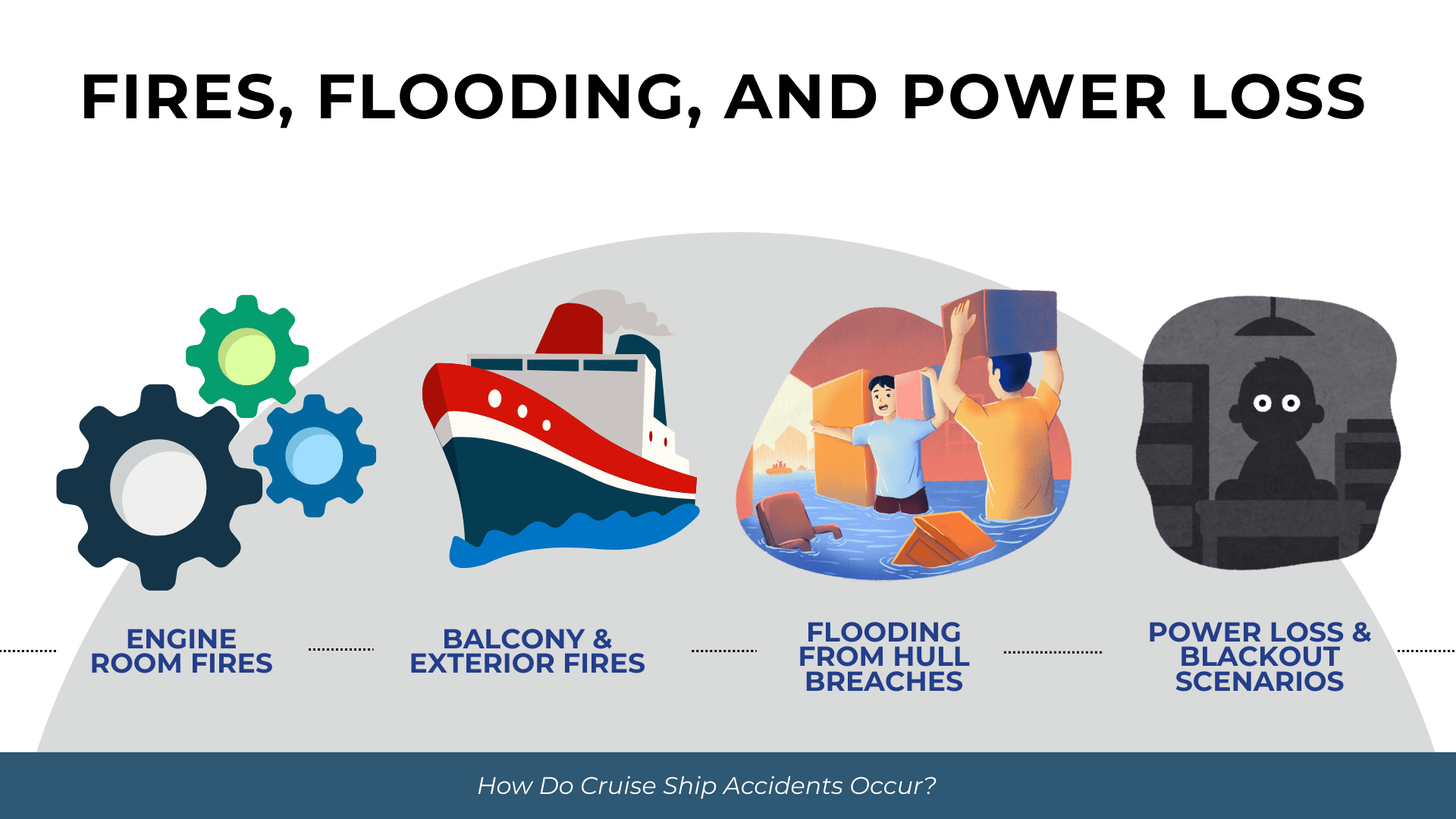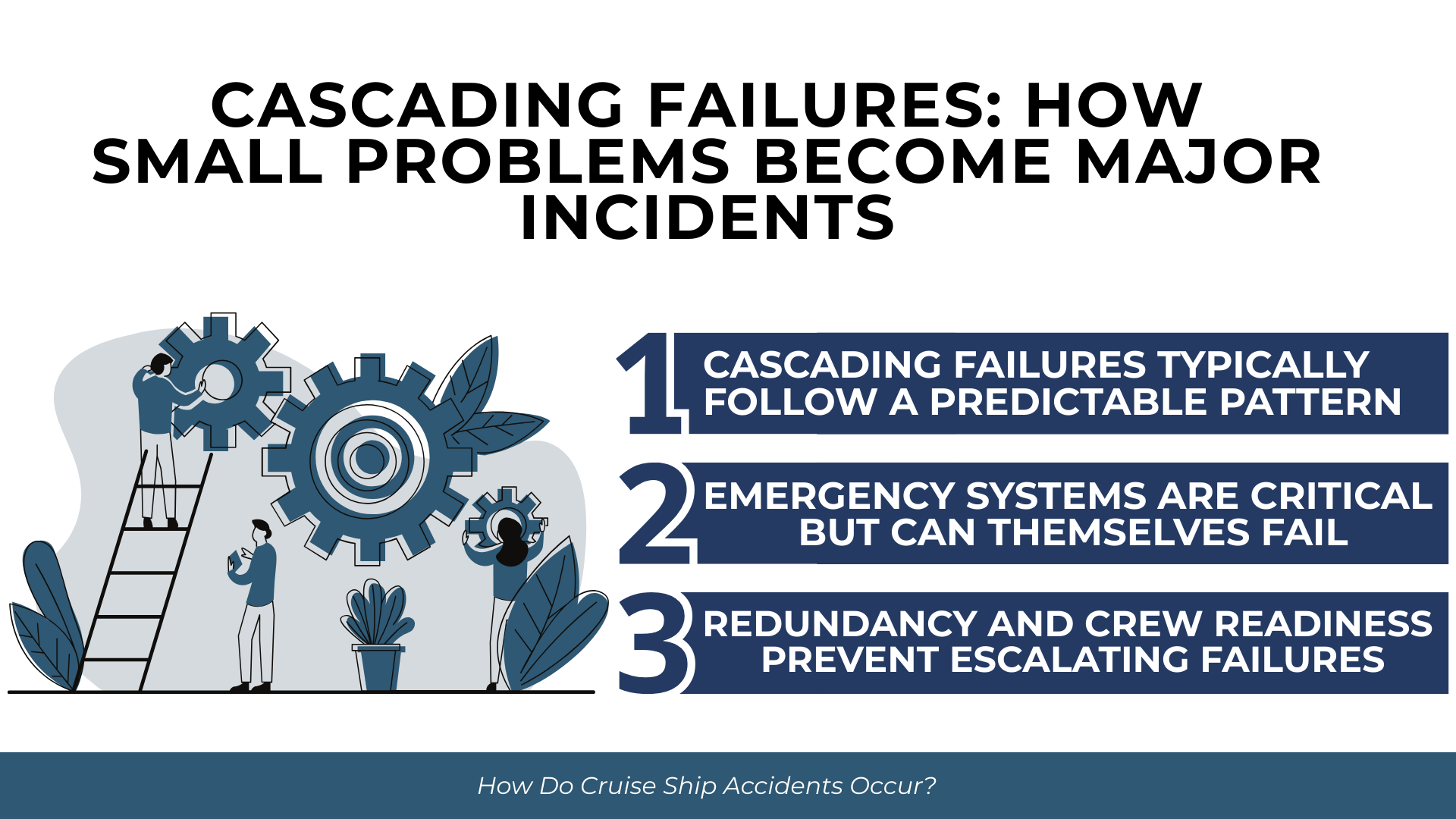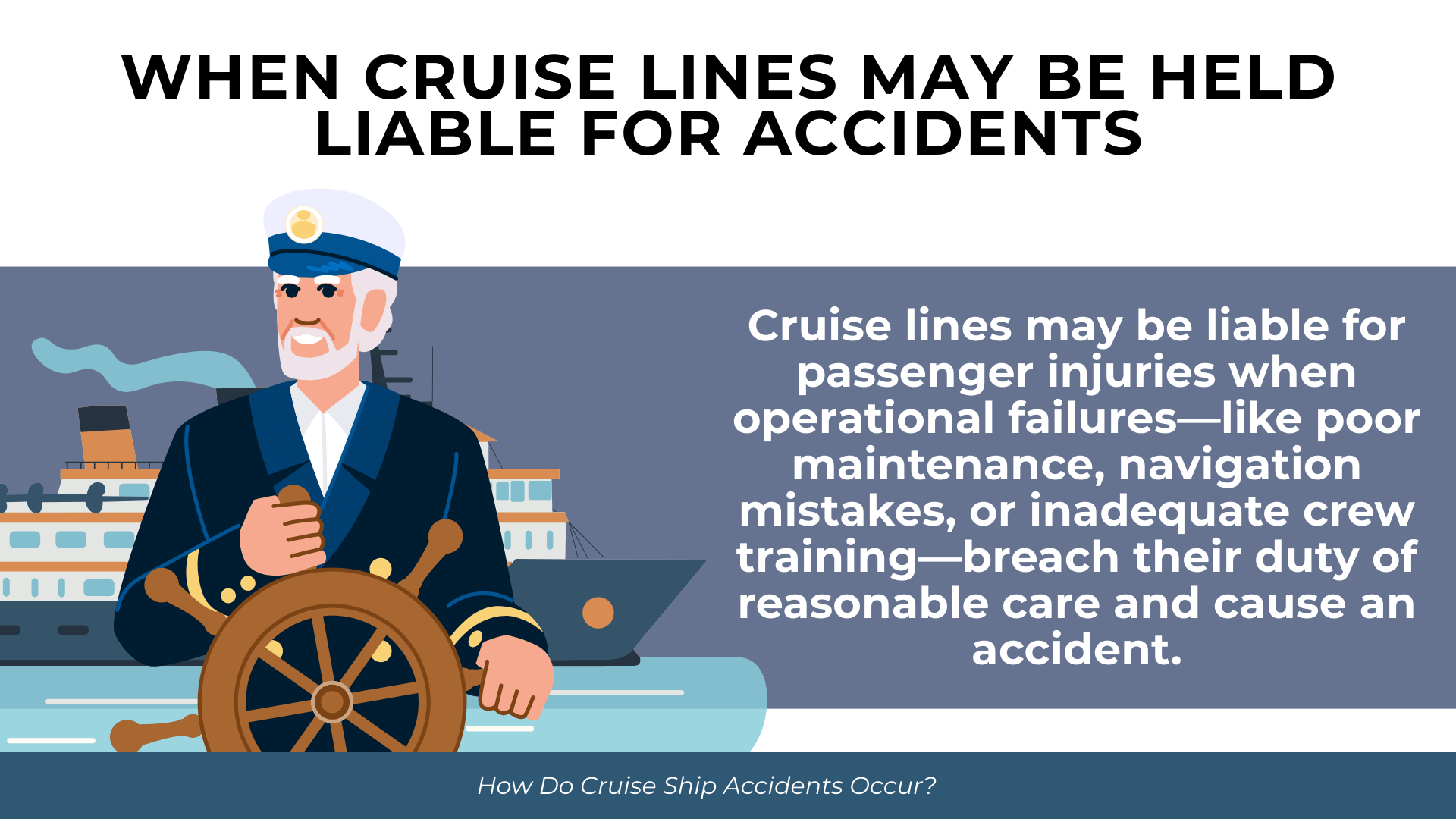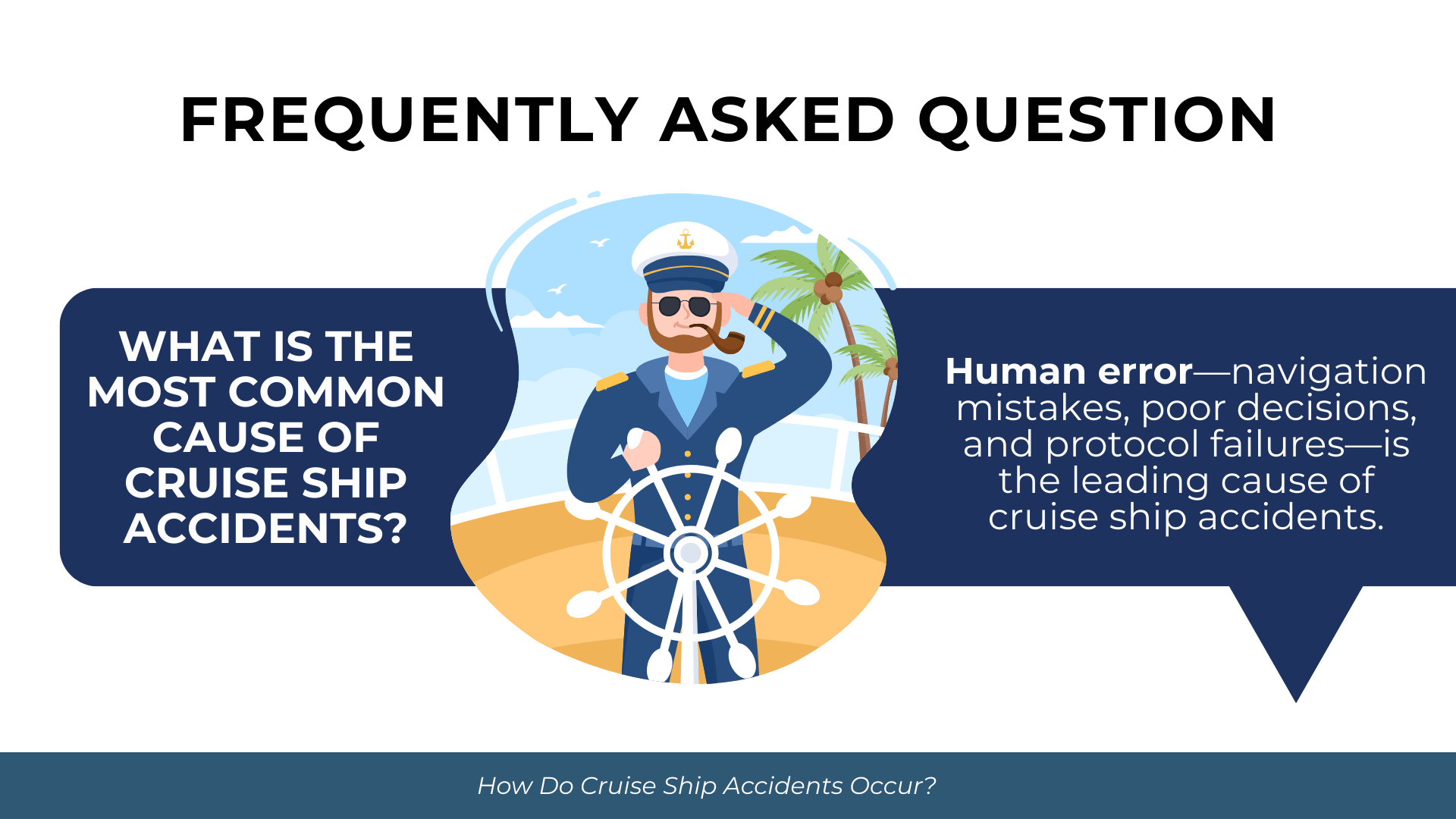Cruise ship accidents occur when navigation errors, mechanical breakdowns, human mistakes, and environmental forces overwhelm a vessel’s safety systems. These incidents—groundings, collisions, fires, and loss of control—rarely result from a single failure. Instead, they typically involve a chain of problems that escalate beyond the crew’s ability to respond. Understanding how cruise ship accidents occur helps passengers recognize the operational responsibilities cruise lines owe them and the failures that can give rise to legal claims.
This guide examines the primary causes of cruise ship accidents, from bridge-level navigation mistakes to engine room fires, and explains how these failures can create liability for cruise operators.
What Causes Most Cruise Ship Accidents?
Cruise ships are complex vessels with thousands of systems that must function correctly. When accidents occur, investigators typically find multiple contributing factors rather than a single point of failure.
The role of human error
Human error remains the primary contributor in maritime accidents. Crew mistakes in navigation, decision-making, and equipment operation account for the majority of serious incidents. Even when mechanical systems fail, human responses often determine whether a manageable problem becomes a catastrophe.
Why single failures rarely cause disasters
Modern cruise ships are designed with redundant systems. A single engine can fail without disabling the ship. A single navigation instrument can malfunction without causing a grounding. Major accidents typically require multiple failures occurring together or in sequence.
How failures combine
The most serious incidents follow a pattern: an initial system failure triggers a secondary mechanical impact, human misjudgment compounds the problem, and environmental conditions worsen the outcome. The Costa Concordia (2012) disaster illustrates this pattern—a route deviation led to a reef strike, the hull breach caused flooding, and delays in evacuation orders worsened the outcome.
Navigation Errors and Bridge Failures
Call us today at (305) 694-2676 or
contact us online for a free case evaluation.
Hablamos español.


Cruise ships rely on advanced navigation technology and vigilant bridge teams. Errors in planning or execution can result in catastrophic incidents including groundings, collisions, and allisions with fixed structures.
Route planning and positional awareness mistakes
Navigation errors occur when bridge officers make mistakes in chart reading, route planning, or positional awareness. These errors can go undetected until the ship is already in danger. The types of navigation failures that lead to accidents include:
- Navigational errors. Mistakes in chart reading or route planning can direct a ship into shallow water or shipping lanes. The Royal Majesty (1995) grounded after a GPS failure went unnoticed and the crew failed to cross-check their position.
- Bridge resource management failures. Poor communication and teamwork during critical decisions prevents officers from catching each other’s errors. The Costa Concordia (2012) grounded due to the captain’s unauthorized deviation and a breakdown in bridge communication.
- Autopilot misuse. Misunderstanding automated systems can cause dangerous corrections. The Crown Princess (2006) heeled dangerously due to a crew member who switched off autopilot and made incorrect manual steering commands.
- Traffic and congestion misjudgments. Dense port and channel traffic heightens the risk of maneuvering errors when officers misjudge distances or timing.
- Pilotage issues. Miscommunication with harbor pilots during docking can cause accidents. The Harmony of the Seas (2022) backed into a dock structure due to pilot error.
Bridge resource management breakdowns
Bridge resource management (BRM) protocols exist to ensure multiple officers verify critical decisions. When BRM breaks down, a single officer’s error can go unchallenged. Multinational crews may face language barriers that complicate communication during emergencies, though BRM training is designed to mitigate this risk.
Autopilot and automation failures
Crews can become overly reliant on automated systems. When those systems fail silently—as the GPS did on the Royal Majesty—officers may not recognize the problem until it’s too late. Procedural non-compliance, such as ignoring protocols for cross-checking navigation instruments, often exacerbates these failures.
Mechanical and Technical Breakdowns
Failures in propulsion, steering, power generation, or critical systems can immobilize ships or reduce control, leading to collisions, groundings, or drifting into hazards.
Engine and generator failures
Propulsion loss is among the most dangerous mechanical failures because it eliminates the ship’s ability to maneuver. Engine and generator breakdowns often stem from inadequate maintenance, design flaws, or outdated equipment. Common failure points include:
- Engine room fires. Fuel line failures or lubrication issues can ignite fires that knock out generators. The Carnival Triumph (2013) lost propulsion after an engine room fire left the ship adrift for days.
- Oil system failures. Loss of lubrication pressure can force emergency shutdowns. The Viking Sky (2019) lost propulsion when low oil levels caused engines to fail during a storm.
- Fuel system problems. Contaminated fuel or failed fuel lines can disable multiple engines simultaneously.
- Generator cascade failures. When one generator fails, the increased load on remaining generators can trigger additional failures.
Steering system malfunctions
Loss of hydraulic power or rudder control can leave a ship unable to navigate even if propulsion remains functional. The Norwegian Dawn (2015) experienced a steering glitch that caused a reef grounding. Steering failures are particularly dangerous in confined waters where the ship cannot simply drift until repairs are made.
Propulsion pod and control system failures
Modern cruise ships often use Azipod propulsion systems—rotating pods that provide both thrust and steering. Software or mechanical faults can disable these pods. The Anthem of the Seas (2016) lost thrust in one Azipod due to a clutch failure during a storm. Propulsion control failures can also occur when electrical faults disable the systems that communicate commands from the bridge to the engine room.
How Weather and Environmental Hazards Contribute
Weather significantly influences ship safety. Though forecast tools have improved, sudden events still pose serious risks to cruise ships.
Storms and high seas
Severe weather can disable propulsion systems and damage critical equipment. Heavy seas stress mechanical systems and make emergency repairs difficult. The Viking Sky (2019) nearly grounded after losing propulsion in a storm off Norway. Rough conditions prevented immediate repairs, and passengers had to be airlifted to safety.
Wind-related docking incidents
High winds affect maneuverability during docking operations when ships are moving slowly and have limited ability to correct course. The Carnival Glory experienced a pier collision during strong gusts. Wind-related incidents often occur when ships attempt to dock despite conditions that exceed safe operating limits.
Rogue waves and sudden hazards
Rogue waves are rare but powerful. These abnormally large waves can strike without warning, overwhelming a ship’s design limits. The Viking Polaris (2022) suffered fatalities after a rogue wave shattered windows during an Antarctic expedition. Reduced visibility from fog or precipitation also increases the risk of collisions, requiring enhanced radar vigilance.
Fires, Flooding, and Power Loss
Get started with your complimentary case evaluation today;
call us at (305) 694-2676 or reach us online using our
secure contact form.


Fire, flooding, and power loss are high-risk incidents due to their potential to escalate rapidly. These emergencies can disable critical systems and trap passengers in dangerous conditions.
Engine room fires
Engine rooms contain fuel, lubricants, and hot machinery—creating conditions where fires can ignite and spread quickly. Fire causes on cruise ships include:
- Fuel and oil leaks. Leaking fuel or lubricant can ignite when it contacts hot engine components. The Carnival Splendor (2010) and Carnival Triumph (2013) both experienced serious engine room fires.
- Electrical faults. Short circuits or overloaded systems can spark fires in engine compartments or electrical panels.
- Galley fires. Kitchen equipment failures can cause fires that spread beyond the galley if not quickly suppressed.
- Mechanical friction. Bearing failures or inadequate lubrication can generate enough heat to ignite surrounding materials.
Balcony and exterior fires
Fires can spread via flammable exterior materials on passenger balconies. The Star Princess (2006) fire started from a discarded cigarette and spread via flammable balcony materials. This incident prompted the industry to upgrade balcony fire detection systems and materials.
Flooding from hull breaches
Hull breaches allow seawater to flood compartments beyond design limits. The Costa Concordia’s grounding caused multiple-compartment flooding when the reef tore a massive gash in the hull. Open watertight doors or seal failures can worsen flooding by allowing water to spread beyond intended containment zones.
Power loss and blackout scenarios
Complete power loss—a blackout—can leave a ship dark, unable to steer, and drifting toward hazards. The Carnival Splendor’s engine room fire caused an extended blackout that left passengers without air conditioning, working toilets, or hot food for days. When ships lose power near shore, they risk grounding or collision unless they can restart engines or deploy anchors.
Cascading Failures: How Small Problems Become Major Incidents
Most major cruise ship incidents involve a sequence of escalating issues rather than a single catastrophic failure. Understanding these failure chains reveals how preventable problems become disasters.
The failure chain pattern
Cascading failures typically follow a predictable pattern: an initial system failure causes a secondary mechanical impact, human misjudgment compounds the situation, and environmental conditions worsen the outcome. The Viking Sky (2019) incident illustrates this pattern. An oil pressure issue caused engine failure. Rough seas stressed the ship. The crew deployed anchors to halt the drift toward shore. Passengers had to be airlifted when the situation could not be stabilized.
When safety systems break down
Emergency systems are critical during accidents but can themselves fail. Lifeboat malfunctions can prevent safe evacuation—the Carnival Dream (2025) experienced a lifeboat falling from its davits during a port test. Delayed alarm or evacuation orders contributed to confusion during the Costa Concordia disaster. Emergency generator failures can leave ships without backup power when they need it most.
Breaking the chain early
System redundancy and crew readiness are crucial to breaking failure chains before they escalate. When crews respond quickly to initial failures, verify system status, and follow emergency protocols, they can often prevent manageable problems from becoming catastrophes. The failures that lead to major incidents often involve breakdowns in these human responses as much as mechanical problems.
When Cruise Lines May Be Held Liable for Accidents
When cruise ship accidents injure passengers, the cruise line may bear legal responsibility if its negligence contributed to the incident.
The cruise line’s duty of care
Cruise lines owe passengers a duty of reasonable care. This duty requires them to maintain vessels in safe condition, train crew members adequately, and operate the ship in accordance with maritime safety standards. When accidents occur due to failures in these responsibilities, the cruise line may be liable for resulting injuries.
How operational failures create liability
The operational failures discussed throughout this article—navigation errors, mechanical breakdowns, inadequate maintenance, poor crew training—can all establish that a cruise line breached its duty of care. If a grounding occurs because officers failed to follow navigation protocols, or a fire spreads because maintenance crews neglected engine room inspections, these failures support claims that the cruise line acted negligently.
What injured passengers need to prove
Passengers seeking compensation after cruise ship accidents must generally prove that the cruise line owed them a duty of care, that the cruise line breached that duty through some act or omission, that this breach caused the accident or their injuries, and that they suffered actual damages. Evidence of the operational failures that caused the accident is central to establishing these elements.
If you were injured in a cruise ship accident caused by operational failures, a cruise ship injury attorney can evaluate whether the cruise line’s negligence contributed to your injuries.
Frequently Asked Questions
What is the most common cause of cruise ship accidents?
Human error remains the primary contributor to cruise ship accidents. This includes navigation mistakes, poor decision-making during emergencies, overreliance on automation, and failures to follow established safety protocols. Even when mechanical systems fail, human responses typically determine whether the situation can be controlled.
Can mechanical failures cause a cruise ship to lose control?
Yes. Engine failures, steering malfunctions, and propulsion system breakdowns can all cause a ship to lose the ability to maneuver. The Viking Sky (2019) lost propulsion during a storm and nearly grounded before crew members could restart the engines. The MSC Opera (2019) struck a docked vessel in Venice after a propulsion system failure left it unable to stop.
How do weather conditions contribute to cruise ship accidents?
Severe weather can disable propulsion systems, damage equipment, and make navigation more difficult. High winds during docking operations have caused multiple pier collisions. Storms can stress mechanical systems to the point of failure. Rogue waves, though rare, have caused injuries and fatalities on cruise ships.
What happens when a cruise ship loses power at sea?
A complete power loss leaves a ship unable to steer, operate essential systems, or communicate effectively. The ship may drift toward hazards like shorelines or other vessels. Emergency generators are designed to provide backup power, but these systems can also fail. Extended blackouts affect habitability, disabling air conditioning, plumbing, and food service.
Are cruise lines responsible for accidents caused by equipment failure?
Cruise lines can be held liable when equipment failures result from inadequate maintenance, outdated systems, or known defects that the cruise line failed to address. The duty of reasonable care requires cruise lines to maintain their vessels properly. When mechanical failures cause accidents, evidence of maintenance failures or ignored warning signs can support claims that the cruise line acted negligently.
Conclusion
Cruise ship accidents occur through the interaction of navigation errors, mechanical failures, human mistakes, and environmental hazards. Understanding how these incidents develop—often as cascading failures rather than single events—reveals the operational responsibilities that cruise lines bear. Failures in maintenance, training, bridge communication, and emergency response can all contribute to accidents that injure passengers.
If you or a family member suffered injuries in a cruise ship accident, you may have grounds for a legal claim against the cruise line. Prosper Injury Attorneys represents passengers injured in maritime incidents throughout Miami and nationwide. Contact a Miami cruise ship injury attorney for a consultation about your case.

